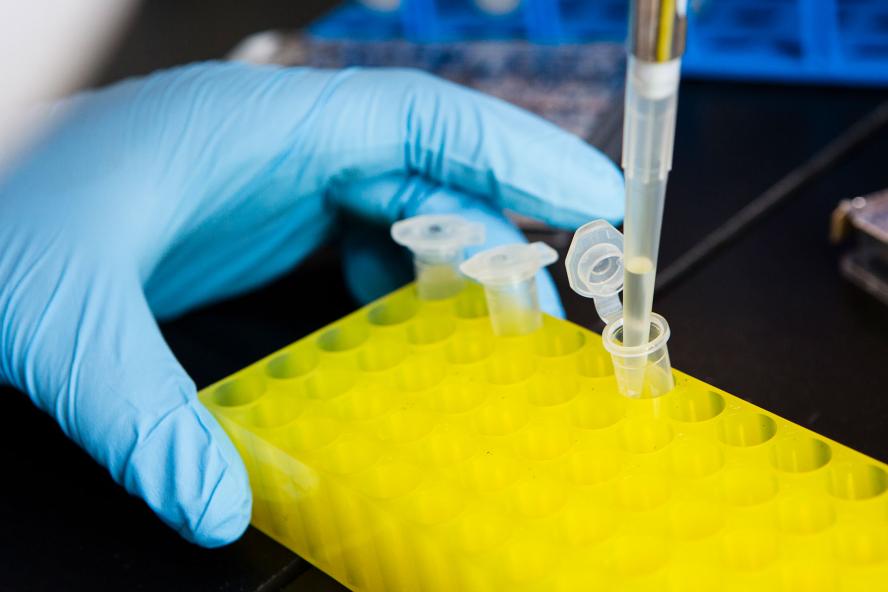Chemical Engineering
Spring: Sep 15
Summer: n/a
Part-time (Daytime)
Overview
The Chemical Engineering master's program trains students to apply the principles of chemistry, biology, physics, and math to solve problems that involve the production or use of chemicals, fuel, drugs, food, and many other products.
Scholarships Available
Some School of Engineering master's and certificate programs offer scholarships to qualified students. To receive full consideration, be sure to complete your application before the submission deadline. Contact the Office of Graduate Admissions at gradadmissions@tufts.edu for more information.
Program Highlights
With small classes and cutting-edge, interdisciplinary research led by innovative faculty, Tufts' Department of Chemical and Biological Engineering is the ideal place to pursue your path. Graduate students have the option of a master of science degree with or without a thesis.
Research areas include:
- Green energy and nanostructured electronics
- Smart polymers, membranes, and separations
- Tissue and metabolic engineering
- Nanobiofabrication
- Industrial processes
- Thermodynamics
- Complex kinetics
Master's degrees require a minimum of 30 credits and the fulfillment of at least 10 courses at the 100-level or above with grades of S (satisfactory) or at least a B-.|
Graduate Cooperative Education (Co-Op) Program
The School of Engineering's Graduate Cooperative Education (Co-Op) Program provides students with the opportunity to apply the theoretical principles they have learned in their coursework to real-world engineering projects. Gain up to six months of full-time work experience, build your resume, and develop a competitive advantage for post-graduation employment. Learn more about the Co-Op Program.
Program Outcomes
Chemical engineers often focus on energy production, catalysis, metabolic and cell engineering, nanomaterials and biomaterials, and systems engineering. They design processes and equipment for large-scale manufacturing, plan and test production methods and byproducts treatment, and direct facility operations.
Application Requirements
Applicants to the MS in Chemical Engineering program are generally expected to have earned a prior degree in Chemical Engineering. Applicants with degrees in closely related engineering disciplines (such as Materials Science and Engineering or Polymer Engineering) who already have a working knowledge of the core course content of this program (i.e., partial differential equations describing heat, mass, and momentum transfer processes, chemical kinetics/reactors and catalysis, chemical thermodynamics) are also encouraged to apply.
Please note that applicants with degrees in Chemistry or Biochemistry are expected to have already completed coursework in ordinary/partial differential equations (at a minimum), and ideally heat/mass/momentum transport, as well. These courses should be clearly shown on the transcript(s) and must also be described in the applicant's personal statement.
- Application Fee
- Resume/CV
- Personal Statement
- Transcripts
- Three letters of recommendation
- Official TOEFL, IELTS, or Duolingo test scores (if applicable)
- GRE General Test scores are not required
- Portfolio (optional)
Tuition & Financial Aid
At Tufts University, we believe every qualified applicant deserves the opportunity to pursue graduate study. We are dedicated to helping you understand your financial options and to ensuring that graduate education at Tufts is both accessible and within reach.
Tuition costs for this graduate program are billed at a per credit rate:
| Estimated Tuition for MS Program | |
|---|---|
| Tuition* | $1,799 per credit |
| Total Credits Required | 30 |
| Enrollment Status | Full-Time: 3-4 courses per semester (9-12 credits) Part-Time: 1-2 courses per semester (3-6 credits) |
| Estimated Tuition per Semester | Full-Time: $16,191 - $21,588 per semester (9-12 credits) Part-Time: $5,397 - $10,794 per semester (3-6 credits) |
| Estimated Total Tuition* | $53,970 |
*Estimated based on 2025-2026 tuition rates. Rates are subject to change each academic year. For further information about the full cost of attendance, including additional fees and estimated indirect costs (housing, transportation, etc.), please visit Student Financial Services.
The Tufts University School of Engineering offers partial, merit-based tuition scholarships for the majority of our graduate and certificate programs. All applicants are automatically considered for these awards as part of our holistic admissions review process—no separate scholarship application or additional materials are required.
Additional funding opportunities may include Tufts Double Jumbo Scholarships for Tufts graduates, Bridge Program Scholarships for students and alumni from select partner institutions, and veteran and military education benefits for eligible service members and their dependents, including participation in the Yellow Ribbon Program.
To further support your investment in a Tufts graduate education, a range of financing options are available, including federal and private student loans. For more details, please visit our Graduate Financial Aid page.
Career Outcomes

Average Salary: $112K+
Projected Job Growth (2022-2032): 8%
*Sources: Average salary and projected job growth statistics are from the U.S. Bureau of Labor Statistics Occupational Outlook Handbook.
Faculty

Emmanuel (Manolis) Tzanakakis

Emmanuel (Manolis) Tzanakakis
Research/Areas of Interest: stem cell and tissue engineering, optogenetics, diabetes

Ayse Asatekin

Ayse Asatekin
Research/Areas of Interest: membranes, polymer science, material science, separations, surface chemistry

Prashant Deshlahra

Prashant Deshlahra
Research/Areas of Interest: heterogeneous catalysis, sustainable production of chemicals and fuels, DFT calculations

Nathaniel Eagan

Nathaniel Eagan
Research/Areas of Interest: Sustainability, experimental heterogeneous catalysis, clean energy, fuels and chemicals, biomass

Milo Koretsky

Milo Koretsky
Research/Areas of Interest: engineering education research, learning and engagement in the university classroom, development of disciplinary practices, instructional design and technology development, instructional practices, organizational change, social practice theory

Kyongbum Lee

Kyongbum Lee
Research/Areas of Interest: metabolic engineering, tissue engineering, systems biology

Graham Leverick

Graham Leverick
Research/Areas of Interest: electrochemical energy storage and conversion, batteries, electrolytes

Derek Mess

Derek Mess
Research/Areas of Interest: thermal barrier coating (TBC), solid oxide fuel cell (SOFC) ceramics, carbon dioxide acceptors

Nik Nair

Nik Nair
Research/Areas of Interest: synthetic biology, systems bioengineering, protein engineering, metabolic engineering, biofuels, biocatalysis

Matthew Panzer

Matthew Panzer
Research/Areas of Interest: Ionic liquids, ionogels, eutectogels, polymers, ion transport, electrochemical energy storage

Daniel Ryder

Daniel Ryder
Research/Areas of Interest: process control

James Van Deventer

James Van Deventer
Research/Areas of Interest: Synthetic Biology, Chemical Biology, Protein Engineering, Antibody Engineering, Drug Discovery, Genetic Code Expansion, Noncanonical Amino Acids, Tumor Microenvironment.

Hyunmin Yi

Hyunmin Yi
Research/Areas of Interest: nanobiofabrication, smart biopolymers, BioMEMS, material science